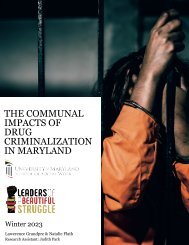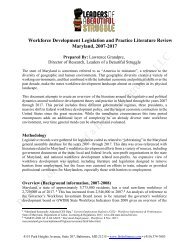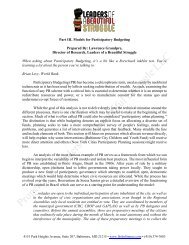Drug Decriminalization in Maryland Through an African Centered Research Paradigm- Analysis and Recommendations
This document offers guidance for theorizing questions related to a proposed research project purposed to advance drug decriminalization in Maryland.
This document offers guidance for theorizing questions related to a proposed research project purposed to advance drug decriminalization in Maryland.
- No tags were found...
You also want an ePaper? Increase the reach of your titles
YUMPU automatically turns print PDFs into web optimized ePapers that Google loves.
While the scientific method claims to seek universal knowledge through a system of<br />
empirical validation, <strong>in</strong> reality, the cultural assumptions of those who build scientific <strong>in</strong>stitutions<br />
impede the <strong>in</strong>troduction of culturally specific ways of th<strong>in</strong>k<strong>in</strong>g <strong>in</strong>to the paradigm. Morg<strong>an</strong> State<br />
University professor Jerome Schiele discusses this <strong>in</strong> his critique of the concept of objectivity,<br />
writ<strong>in</strong>g:<br />
“...Although qualitative methods may do a better job at elicit<strong>in</strong>g <strong>in</strong>-depth aspects of <strong>an</strong><br />
<strong>in</strong>dividual's or group's <strong>in</strong>terpretation of the world th<strong>an</strong> qu<strong>an</strong>titative methods, qualitative<br />
methods also are restricted <strong>in</strong> their ability to know <strong>an</strong>d <strong>in</strong>terpret hum<strong>an</strong> behavior. This is<br />
partly because most current qualitative methods, similar to qu<strong>an</strong>titative methods, share the<br />
same underly<strong>in</strong>g assumptions regard<strong>in</strong>g knowledge/scientific <strong>in</strong>quiry that orig<strong>in</strong>ate from<br />
Eurocentric culture; they are as follows:<br />
1. Hum<strong>an</strong> bias <strong>an</strong>d emotion should be controlled, reduced, or elim<strong>in</strong>ated <strong>in</strong> hum<strong>an</strong> <strong>in</strong>quiry.<br />
2. There should be separate expectations for the observer <strong>an</strong>d the observed, even if their<br />
reciprocity is acknowledged. In other words, the observer <strong>an</strong>d observed are usually viewed<br />
as separate entities, often-times with mutually exclusive roles.<br />
3. When collect<strong>in</strong>g, process<strong>in</strong>g, <strong>an</strong>d cod<strong>in</strong>g <strong>in</strong>formation, phenomena should be reduced to<br />
their simplest forms (i.e. reductionism).<br />
4. Directly observable (i.e., material) phenomena are deemed the most legitimate forms of<br />
reality. In other words, deemphasis is placed on unseen or spiritual aspects of reality.<br />
5. Rational, l<strong>in</strong>ear, <strong>an</strong>d dichotomous th<strong>in</strong>k<strong>in</strong>g are the primary modes through which hum<strong>an</strong><br />
behavior is understood <strong>an</strong>d <strong>in</strong>terpreted…” (Schiele, 2000)<br />
The forms of thought that Schiele identifies l<strong>in</strong>ks to notions of a rational, th<strong>in</strong>k<strong>in</strong>g subject with<br />
l<strong>in</strong>ks to Europe<strong>an</strong> philosophy from René Descartes to classical liberal philosophers like John<br />
Locke. Before we underst<strong>an</strong>d the implications these specific characteristics have for research of<br />
drug decrim<strong>in</strong>alization, it is vital that we:<br />
1. Acknowledge that these differences are real <strong>an</strong>d me<strong>an</strong><strong>in</strong>gful<br />
4151 Park Heights Avenue, Suite 207, Baltimore, MD 21215 • www.lbsbaltimore.com • (410) 374-7683









